| May/June
2011 - Vol. 50.
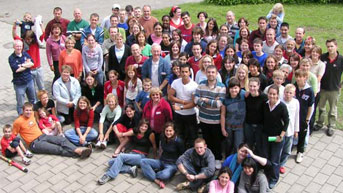
Families and singles gather
for a European Communities Retreat
What
Is the Sword of the Spirit?
...
Some
Questions and Answers
By Jerry Munk
What
is the Sword of the Spirit?
Simply put,
the
Sword of the Spirit
is an association of self-governing communities that have agreed to do
some things the same way and to do some things together. The Sword of the
Spirit is governed by an international assembly, composed of the senior
leader of each member community. In addition, the Sword of the Spirit is
divided into a number of regions: the North American Region, the Ibero-Americana
Region (Latin America and the Iberian Peninsula); the European Region,
the Asian Region, and the South Pacific Region. Each region is governed
by a regional council, on which sit the senior leaders of member communities
in that region.
Why
the name, Sword of the Spirit?
“Sword of
the Spirit” is a term one finds in the Bible. The term is a reference to
the Bible itself (Ephesians 6:17) and, more generally, “sword” is sometimes
used in Scripture to refer to an instrument wielded by God for his purposes.
When leaders of the communities met to pray for direction, they were led
to take this name as a statement of the call God had given to us. Therefore,
the Sword of the Spirit is a name signifying our role as a missionary body
of Christian disciples, witnessing to and proclaiming the word of God in
this age of spiritual warfare – a people who can be used by the
Lord to accomplish His purposes.
What
is the purpose of the Sword of the Spirit?
The Sword
of the Spirit stands and works for a number goals:
-
To help people
commit their lives fully to Jesus Christ and become mature Christians.
-
To help people
experience the presence and power of the Holy Spirit so they may live and
serve in a spiritually effective way.
-
To foster love
and worship of God and a life that is lived for His glory.
-
To form loving,
personal relationships that support an ongoing Christian life.
-
To develop a way
of life where the Gospel can be lived fully.
-
To do the work
of evangelization—to help other people come to know Jesus Christ.
-
To proclaim and
defend the Gospel.
-
To foster Christian
unity through collaboration and cooperation among Christians from different
traditions.
In addition, the
Sword of the Spirit understands that it is called to be a bulwark. The
dictionary defines a bulwark as a solid, wall-like structure built for
protection and support. By building an international community of communities
linked together in a common way of life and engaging a common mission,
the Sword of the Spirit is a bulwark: a structure that provides protection,
support, and defense in the face of modern challenges to the Christian
way of life. By being part of a bulwark, members can better respond to
those challenges in unified and life-giving ways.
Is
the Sword of the Spirit a church?
Sword of the
Spirit communities are not churches. Members of Sword of the Spirit communities
belong to many different Christian churches. They remain active in their
local parish or congregation. They live a common life in community that
is complementary to and supportive of church membership. Some Sword of
the Spirit communities are ecumenical: members attend churches from different
Christian communions. Some Sword of the Spirit communities represent a
single church communion. There are a number of Catholic communities in
the Sword of the Spirit. There is also an Orthodox community in The Sword
of the Spirit.
Is
it necessary for all Christians to live in community?
The New Testament
describes the Christian life in ways that are clearly corporate and communal.
Christians are called to relate to one another as “brothers and sisters.”
They are to be knit together as “members of one body.” They are “members
of the household and family of God.” In this sense, all Christians are
called to live in community. Relatively few Christians will live in a Sword
of the Spirit community. By its existence, however, The Sword of the Spirit
hopes to be a witness to the communal dimension of the Christian faith,
a dimension that is weak or missing in the lives of many believers. We
hope that our life together encourages individuals and groups of Christians
to examine the New Testament call to a corporate life and take tangible
steps to grow in it.
Why
form community alongside, but still separate from, church life?
Christian
communities are formed with those people who hear the Lord’s call and are
willing to embrace it freely. In some circumstances those who hear this
call and respond to it are scattered among several Christian traditions.
In other circumstances those who hear this call and respond to it are from
a single church communion and believe that the Lord would have them build
community with people from that communion. We have come together in communities
because God can act in specific communities to accomplish things that can
then be made available to the wider church. Members of Sword of the Spirit
communities love the churches of which they are members. Many serve their
local congregation and work for renewal within it. Members see their involvement
in The Sword of the Spirit as complementary to and part of their commitment
to their church – and to the larger body of Christ.
Why
is the Sword of the Spirit ecumenical?
The word “ecumenical”
is a Greek word meaning the whole of creation or the whole family. It is
a word that implies all of the Christian people, regardless of the church
communion to which they belong. We believe the Lord has called The Sword
of the Spirit to be a special witness to ecumenical cooperation. Division
and bad relating among Christians has been common for most of the last
2000 years. The issues that divide us are important, but so is the fact
that we are brothers and sisters in Jesus Christ. Members of The Sword
of the Spirit, even members of single-communion communities, work to give
witness to the unity that we already share in Jesus Christ. We actively
follow the guidelines given by our respective churches for how we can and
should cooperate as brothers and sisters in Christ – while we wait and
pray for greater Christian unity. We seek to live our Christian life in
a way that will further the unity of God’s people, seeking to find a convergent
way of expressing our Christian life in harmony with our church identity.
It is encouraging that many leaders of our respective churches have been
involved in an ongoing ecumenical dialogue, and have made progress towards
greater unity and understanding.
Sword
of the Spirit communities are “lay communities.” What does that mean?
Christians
use the term “laity” to distinguish church members from the ordained clergy:
priests, ministers, those in monastic life, and, in some traditions, missionaries.
Ordained clergy do participate actively in some of our communities, but
the focus of our communities is on living a day-to-day Christian way of
life, a way of life that is helpful and supportive regardless of one’s
vocation: male or female, married or single, lay or clerical. All Christians,
not just clergy, are called to live fully for Jesus Christ and His kingdom.
The
Sword of the Spirit is “charismatic.” What does that mean?
You may notice
some different things about our prayer meetings and gatherings: people
raise their hands, pray out loud, pray in a language that you (and they)
do not understand, and every so often someone will read a Bible passage
or say something he or she believes comes from the Lord. All of these things
have been part of Christian worship since the Church was established, but
they had, for the most part, fallen into disuse. In recent decades, the
Charismatic Renewal has changed this for millions of Christians. Through
this renewal, people have come to a more personal and tangible experience
of the person, the power, the guiding, and the gifts of the Holy Spirit.
(For a partial list of the gifts of the Holy Spirit see 1 Corinthians 12:7-9.)
This experience
is similar to what happened to the early Christian believers, as we read
in Acts 2:1-13: All the believers were gathered in one place...they were
all filled with the Holy Spirit and began to talk in other languages as
the Spirit enabled them to speak. The Apostle Peter explained what was
happening by quoting an Old Testament prophet: “This is what I will do,
says the Lord. I will pour out my Spirit on everyone. Your sons and your
daughters will proclaim my message; your young men will see visions, and
your old men will dream dreams. On My servants, both men and women, I will
pour out my Spirit and they will proclaim my message” (Acts 2:17-18).
[This
article is excerpted from, The
Sword of the Spirit: Communities of Disciples on Mission,
by Jerry Munk. Used with permission. The booklet can be purchased from
Tabor House.]
|
Some communities
worldwide
When
the People of God community in Beirut, Lebanon, began, its members did
not know that they were about to be plunged into a 15 year civil war that
would decimate their country and threaten their lives. The encouragement
they received from other communities in The Sword of the Spirit made it
possible for members of the community to remain in Lebanon, survive the
war, and maintain hope for the future. Today the People of God is playing
an important role in the revitalization of local Catholic and Orthodox
churches. It also has an active outreach to university students and sponsors
a large movement of Christians from the many traditions represented in
Beirut.
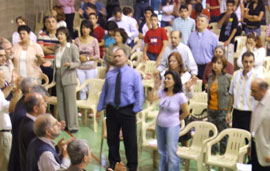
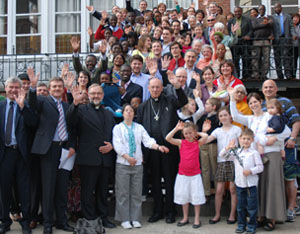
Members
of Jerusalem Community in Belgium welcome the recent visit of Archbishop
Leonard from Brussels.
The Word of Life Community
in Ann Arbor, Michigan, USA, is a transgenerational community of married
couples, families, and singles, where children, parents, grandparents,
and even great grandparents live for and serve the Lord together. One family
in the Word of Life (the Vandagriff family, pictured below) spans four
generations and has been active in the community for most of its history.
The community comprises more than 400 members from a variety of backgrounds,
cultures, and Christian traditions. The Word of Life is engaged in evangelism
among university students, has an outreach to youth at risk in Detroit,
and helps with the development of newer communities in North America.
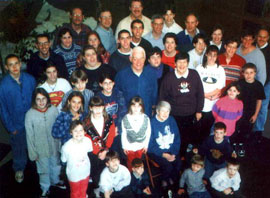
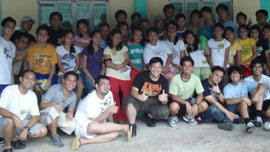
The Joy
of the Lord community in Manila, Philippines, has seen steady growth and
fruitfulness in service and mission for more than 30 years. Their seven
distinct movements reach out to more than 20,000 people throughout the
Philippines. Outreach efforts include support and care for married couples
and families, university students and young professionals, widows and single
mothers, and serving the very poor. They also provide teaching and training
for Christian leaders, and serve many developing Christian communities
throughout Asia. Photo above: A mission team went to the Island of Tingloy
to give a leadership seminar for high school students there.
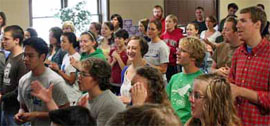
Last summer
some 90 students and staff leaders from University Christian Outreaches
in North America gathered for 10 days of teaching, training, prayer, and
fellowship.
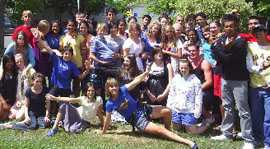
young people from the Lamb of God community in New Zealand gather for a
weekend retreat
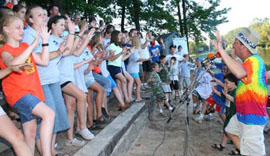
Children are an important part of life in Christian
community. Member communities offer many programs that reach out to children,
and children actively participate in many aspects of community life. In
the photo above, children from the Work of Christ Community in Lansing,
Michigan, enjoy a week-long summer camp. The camp recently celebrated its
30th anniversary.

The Servants of the Word is an international, ecumenical brotherhood of
men living single for the Lord within The Sword of the Spirit. Formed in
the 1970s, the Servants of the Word has about 50 life-long members serving
in several different countries. By choosing not to marry, brothers in The
Servants of the Word are free to devote the time, energy, and commitment
typically invested in family life to other services and mission needed
to spread the Gospel. The brotherhood is especially committed to evangelistic
work among high-school and college-age youth, building Christian community,
and formative Christian teaching. Servants of the Word households can be
found in the United States (Ann Arbor, Chelsea, Detroit, Lansing, and Grand
Rapids, Michigan), the United Kingdom (London, England, and Belfast, Northern
Ireland), in Manila, Philippines, and Monterrey, Mexico.
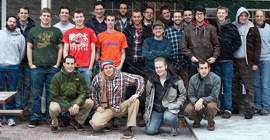
S/W brothers
from Michigan on Winter Reteat - 2011

The
Sword of the Spirit: Communities of Disciples on Mission
new
booklet by Jerry Munk, 26 pages
available
from Tabor House
http://www.sos-nar.com/tabor.htm
When
people first encounter the Sword of the Spirit, they often have a number
of questions. This booklet provides a good overview of the New Testament
call for all Christians to live in a new society and one response to that
call, the Sword of the Spirit. Especially helpful for guests and newcomers.
|